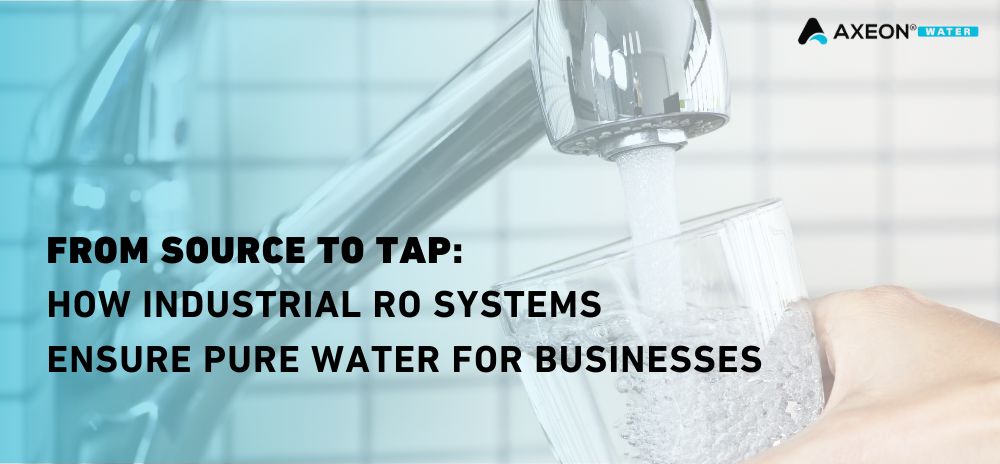Technical Articles

Industrial RO Systems
Industrial Reverse Osmosis Systems have revolutionized the way companies ensure the supply of pure water within their businesses. These systems utilize advanced technology to remove impurities, contaminants, and dissolved minerals from water sources, providing businesses with clean and reliable water for various applications.
Industrial RO systems operate through a process called reverse osmosis, where water is passed through a semi-permeable membrane to separate impurities from the water molecules. This highly efficient filtration process leaves businesses with water that meets stringent quality standards, making it suitable for drinking, manufacturing processes, and other industrial applications.
These systems are designed to handle high volumes of water, making them ideal for businesses and processes that require a large supply of purified water. They can effectively remove common contaminants such as bacteria, viruses, heavy metals, chemicals, and dissolved solids, ensuring that the water used in business operations is safe and of the utmost quality.
Industrial RO systems offer several advantages for commercial businesses. They provide a cost-effective solution compared to other purification methods, as they require minimal energy consumption and have lower maintenance costs. They are highly customizable and can be tailored to meet specific water quality requirements, ensuring that businesses have access to water that meets their unique needs.
Their advanced filtration process effectively removes impurities and contaminants, providing clean and reliable water for various applications. With their cost-effectiveness and customization options, RO systems are an essential investment for any business that prioritize water quality and sustainability.
Importance of Pure Water for Businesses
Water is a vital resource for businesses across different industries. Some examples are water vending, car wash spot free rinsing, window washing, misting, fogging, humidification, water jet cutting, hydroponics, horticulture, dialysis, and many more. Ensuring a supply of clean water is crucial for various applications, including manufacturing processes, employee consumption, and maintaining equipment.
Benefits of Using Pure Water in Industries
Using pure water in industrial processes offers several significant advantages:
- Product Quality and Consistency: Pure water ensures that products meet stringent quality standards by preventing contamination and maintaining consistency in manufacturing processes.
- Equipment Performance and Longevity: Impurities in tap water or municipal water can cause scale build-up, corrosion, or clogging in machinery. Pure water reduces the risk of equipment breakdowns, improves efficiency, and increases equipment lifespan.
- Cost Savings: Utilizing pure water reduces the maintenance, repair, and replacement costs associated with damaged equipment due to impurities. It also minimizes the risk of product defects and recalls, saving businesses from potential financial losses.
Impact of Impure Water on Businesses
Using impure water can have detrimental effects on businesses:
- Reduced Product Quality: Impurities in water can negatively impact product quality, affecting taste, appearance, and overall customer satisfaction.
- Increased Downtime: Equipment malfunctions caused by impure water may lead to production delays and increased downtime, resulting in financial losses and customer dissatisfaction.
- Health and Safety Risks: Contaminated water can pose health risks to employees and consumers, leading to potential legal liabilities and damage to the company's reputation.
- Pre-Treatment: This stage involves removing larger particulate matter, such as sediments and debris, through processes like filtration and settlement down to micron level such as 1 or 5 microns.
- Reverse Osmosis Membrane: The heart of the RO system, the semi permeable membrane, filters and separates out microscopic impurities, including dissolved salts, organic compounds, and bacteria.
- Pressure Pump: The pressure pump boosts the water pressure, allowing the water to pass through the RO membrane effectively.
- Post-Treatment: After the water passes through the RO membrane, it goes through a post-treatment process like disinfection and pH adjustment to ensure that it meets the desired purity levels.
- Membrane Cleaning: To prevent fouling and scaling, specialized cleaning techniques like chemical cleaning and backwashing are employed to maintain the optimal performance of the Reverse Osmosis membrane.
- Remote Monitoring and Control: Many modern industrial RO systems are equipped with sophisticated monitoring and control systems. These allow operators to monitor key parameters remotely, optimize system performance, and address any issues promptly.
- Food and Beverage: The food and beverage industry relies heavily on water for processing, cleaning, and product preparation. RO systems ensure that the water used in these processes is free from impurities, contaminants, and chemicals, meeting stringent quality standards.
- Pharmaceutical: In the pharmaceutical industry, water quality is critical for drug manufacturing and laboratory processes. Industrial RO systems provide reliable water purification, eliminating contaminants and maintaining high-quality standards for pharmaceutical products.
- Petrochemical: Petrochemical companies require water for cooling, processing, and refining applications. Industrial RO systems aid in removing contaminant, dissolved solids, salts, and other impurities from hard water, resulting in treated water that prevents equipment corrosion and ensures efficient operations.
- Electronics Manufacturing: The electronics manufacturing industry relies on precise and ultra-clean water for various production processes. RO systems play a vital role in removing impurities, ions, and particulates, enabling the production of high-quality electronic components.
- Power Generation: Power plants utilize water for cooling systems and steam generation. Industrial RO systems help maintain the efficiency and performance of power generation facilities by providing high-quality water that is free from contaminants and impurities.
Ensuring a supply of pure water is essential for businesses to maintain product quality, equipment performance, and cost savings. Impure water can have adverse effects on product consistency, equipment longevity, and pose health and safety risks. Thereby, investing in industrial RO systems to obtain pure water is a wise choice for businesses looking to prioritize quality, integrity, and sustainability in their operations.
Industrial RO Systems: Key Features and Technologies
Key Components of Industrial Reverse Osmosis Systems
Industrial Reverse Osmosis system is a water treatment system that is made up of several key components that work together to remove impurities and contaminants from the water.
Advanced Technologies Used in RO Systems
To enhance the performance and efficiency of industrial RO systems, advanced technologies are often incorporated:
By incorporating these key components and advanced technologies, reverse osmosis water systems ensure the delivery of pure water to businesses, enabling them to maintain product quality, optimize equipment performance, and achieve significant cost savings.
Advancements in Industrial RO Systems
Industrial RO systems have witnessed significant advancements in recent years, leading to enhanced efficiency, performance, and reliability. These advancements are geared towards ensuring a continuous supply of pure water for businesses.
Enhancements in Efficiency and Performance
With the incorporation of advanced technologies like energy recovery devices and membrane cleaning techniques, industrial RO systems have become more energy-efficient and capable of maintaining optimal performance. Energy recovery devices harness and reuse energy from the brine waste stream, resulting in improved overall energy efficiency. Membrane cleaning techniques prevent fouling and scaling, prolonging the lifespan and effectiveness of the RO membrane.
Innovations in Monitoring and Maintenance
Modern industrial RO systems now feature sophisticated remote monitoring and control systems. These systems allow operators to monitor key parameters, optimize system performance, and quickly address any issues that may arise. Remote monitoring and control enhance operational efficiency and reduce downtime, ensuring continuous water purification and delivery. By embracing these advancements in efficiency, performance, and monitoring, industrial RO systems can effectively meet the water purification needs of businesses. They provide a reliable and cost-effective solution for maintaining product quality, optimizing equipment performance, and ensuring a steady supply of pure water as well as drinking water from source to tap.
Real-world Applications of Industrial RO Systems
Examples of Industries Utilizing RO Systems
The commercial reverse osmosis system has become indispensable in various industries where a continuous supply of clean water is crucial. Here are some examples of industries that benefit from the implementation of RO systems:
By implementing industrial RO systems, these industries can benefit from a continuous supply of pure water, ensuring product quality, operational efficiency, and compliance with regulatory standards. RO water technology has proven to be a sustainable and cost-effective solution for meeting the water filtration needs of businesses across various sectors.
From Source to Tap: How Industrial RO Systems Ensure Pure Water for Businesses
Implementing industrial reverse osmosis systems has become essential for various industries that rely on a continuous supply of pure water. Industries such as food and beverage, pharmaceutical, petrochemical, electronics manufacturing, and power generation benefit from the implementation of water filter RO systems to ensure clean water supply for their processes.
Industrial RO systems help in removing impurities, contaminants, and chemicals from the water used in these industries. By utilizing the process of reverse osmosis, these systems effectively remove dissolved solids, salts, ions, and particulates, resulting in purified water that meets stringent quality standards.
From source to tap, industrial Reverse Osmosis water filtration systems undergo several stages to ensure the delivery of pure water. These systems typically consist of pre-treatment, membrane separation, and post-treatment processes. The pre-treatment stage involves the removal of large particles, suspended solids, and organic matter. The membrane separation stage utilizes semi-permeable membranes to remove smaller particles, ions, and dissolved salts. Lastly, the post-treatment stage enhances the water's quality by optimizing pH levels and adding necessary minerals.
When choosing an industrial RO system, there are several factors to consider. Firstly, size and capacity considerations are crucial to ensure that the system can meet the required water demand of the business. It is important to choose a system that aligns with the required flow rate and volume needed for efficient operation.
Next, maintenance and support services are essential in ensuring the longevity and effectiveness of the system. Regular maintenance, including filter replacement and system checks, is necessary to prevent any potential issues and maintain optimal performance.
Lastly, industrial RO systems provide businesses with a sustainable and cost-effective solution to meet their water purification needs. By implementing these systems, industries can ensure the delivery of pure water for their processes, contributing to product quality, operational efficiency, and compliance with regulatory standards.
Key Takeaway
From any water source, industrial RO systems undergo several stages, including pre-treatment, membrane separation, and post-treatment processes, to ensure the delivery of pure and safe drinking water. Factors such as size, capacity, and maintenance and support services should be considered when choosing an industrial RO system.
Industrial RO systems provide businesses with a sustainable and cost-effective solution for their water purification needs. By implementing these systems, industries can enhance product quality, improve operational efficiency, and comply with regulatory standards. Investing in industrial RO systems ensures that businesses have a continuous supply of pure water, safeguarding their processes and contributing to their success.
AXEON Water Technologies
AXEON Water Technologies has been a leading company for 35 years, known for their innovative membrane filtration systems. We prioritize trust, partnership, and distinction as their core values, ensuring they deliver high-quality products, reliable customer support, and customized designs. We are at the forefront of developing membrane filtration technologies that cater to diverse industries across the globe, providing comprehensive solutions to help customers save resources, improve efficiency, and cut down expenses. With their strong emphasis on customer success, AXEON is a reputable choice for water purification solutions.
THE RIGHT SOLUTION FOR YOU
Contact us today for more information about our products and services.
CONTACT US
